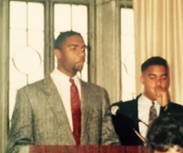John MacLean, Woodlands High School WISE mentor, taught his students to “think WISE-like.”
For 26 years, John served as an enthusiastic WISE mentor, encouraging his students to always be on the lookout for opportunities to connect and network with people when they stepped out of the classroom and into the world for their WISE projects. He estimates that he mentored 130 students. “I still hear from my WISE mentees, some pretty regularly. This is especially gratifying, especially when I hear how the habits my mentees cultivated during their WISE experience translated to college and career.”
Making Connections
John MacLean says that becoming involved with the WISE Program at Woodlands High School in 1986 was “one of the best things that ever happened to me.” The experience of being a new teacher, surrounded by experienced teachers all mentoring their WISE students at the same time, gave him a feeling of interconnectedness with the other teachers. “WISE can be helpful to a new teacher,” explained John. The WISE mentors, he noted, were “kindred spirits, creative minded and nurturing.” They often collaborated as a group, planning WISE trips and enhancements to their mentees’ learning experiences.
“WISE isn’t just a program—it’s an educational philosophy,” explains John. “WISE is all about understanding the interconnectedness of things. Through WISE, students learn to make connections with the community and the world around them, building relationships and a network of resources that will help them succeed now and later in life.”
“The spirit of looking for additional connections is the single most important part of WISE learning,” elaborated John. This means making connections with the community. WISE is, therefore, a great PR tool for schools.
Best Mentor Experiences
In addition to teaching students the importance of networking, John’s job as a mentor was to be a life-long learner. The difference between a mentor and a teacher is the “difference between a guide and an instructor,” said John. “A mentor is a guide. Mentors have to teach and learn.” John continued, “The best experiences are when a mentor knows nothing about a student’s project. There is more back and forth between mentor and mentee, more learning together. WISE is not a passive learning experience for students.”
John learned “all kinds of things” from his mentees’ WISE projects. One year, he took a student to the old World Trade Center and met with a “big wig” at the Commodities Market. During the meeting, John stepped back, which “allowed the student to step forward.” The kid talked all about the WISE program and his project. The experience taught John about not only commodities, but also about kids and what they’re capable of.
John recalls that “one of the best things I ever did with WISE” involved a joint theater program between the WISE students at Woodlands High School and Fanwood High School (New York School for the Deaf). Forty students put on a play that incorporated sign language. The project broke through the isolation experienced by these deaf students. “It was great to see them become connected and empowered,” John recalled.In fact, as a result of the project, several Fanwood students attended the Woodlands prom, and several Woodlands students attended the Fanwood prom.
Former Mentees Appreciate Their WISE Mentor
Even today, John’s former mentees Robert Cort and Matt Jackson say they “would do anything for Mr. MacLean.” “Mr. MacLean is very dear to me,” stated Robert Cort, who is now an entrepreneur and CEO of Cort Athletics.
Robert and Matt credit Mr. MacLean and WISE with giving them the “confidence to go out into the world.” For their WISE project, the two students wrote a provocative play about racism. The play involved 50 students and was performed multiple times. The New York Times even came and interviewed Cort and Jackson.
“It speaks volumes that I’m still in close touch with Mr. MacLean,” said Matt Jackson, who is now a film producer. “He was an incredible mentor without micromanaging. Mr. MacLean didn’t put up a wall. He allowed our creative ideas and our non-conventional production process. He allowed us to be adults and take on something outside the classroom, something with bigger implications, and allowed us to find out what we would want to do in the career world.”
Getting Out in the World
“Students need to get out of the school building and into the world,” notes John. These real-world experiences offer vibrant learning opportunities. “Students’ schedules have become so demanding that it is hard for them to find time to get out in the world. Overprogrammed students don’t have the time to get out of the building and take advantage of the many resources that WISE can introduce.” John emphasizes that it is more important than ever for schools and educators to facilitate these external WISE opportunities to allow students to gain invaluable skills that can’t be learned in the classroom.
Advice to Mentors
John emphasizes that being a WISE mentor is extremely satisfying. “You have to be willing to be a guide. You must be willing to not only ask — but also be asked — questions you don’t have the answers to. You’ve got to both learn and teach.” Because WISE mentors always continue learning, WISE is a great professional development opportunity for teachers. “There is no place better than the WISE Program to continue learning as a teacher,” said John. “Collaborative problem-solving with students can invigorate your teaching with your mentee and in your classroom.
A Parent’s Perspective of WISE
John’s experiences with WISE go far beyond his work at Woodlands High School. He also experienced the thrill of being a WISE parent. All four of his children did WISE projects at Croton-Harmon High School.


 Saving...
Saving...